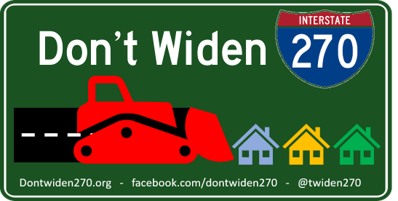Special Saturday Edition: Sign Up Now to Raise Your Voice About Toll Rates!
You don’t have to be an expert to testify at next week’s toll-setting hearings! Everything you need to know is below, including plenty of talking points you can make your own. The more of us who show up and speak up or call in, the stronger the message to MDOT!
The Maryland Department of Transportation State Highway Administration (MDOT SHA) is rushing to approve a predevelopment design contract (the Phase 1 P3 Agreement) for the toll lane project. Transurban is the Australian company awarded the initial one-year $50 million predevelopment contract and has the exclusive right to build toll lanes from the George Washington Parkway to I-70 in Frederick -- a $6 billion contract.
The Maryland Transportation Authority (MDTA) Board voted on June 8 to advance the predevelopment agreement, including holding public hearings. MDTA is an independent agency under MDOT and is responsible for setting toll rates and managing toll collections. As required by law, the public must have the opportunity to comment on the proposed toll rate ranges. It is vital that you participate in this process. The most effective way to make your voice heard is to testify in person on July 12. However, if you can’t testify in person, it is important that you call in on July 14th and give a brief (less than 3 minute) testimony by phone. Note, as indicated below: you must pre-register in order to be admitted to the phone queue.
More information can be found in this excellent article:
Action Item
Participate in the Public Hearings for Proposed HOT Lane Toll Rate Ranges
In-person testimony: July 12 from 2 to 4 p.m. and 6 to 8 p.m. at the Hilton Washington D.C./Rockville Hotel & Executive Meeting Center (just off Rockville Pike near the Twinbrook Metro). You must register in advance. Click here to register or call 888-725-0174. Members of the public will be allotted three minutes.
Call-in testimony: July 14 from 2 to 4 p.m. and 6 to 8 p.m. Provide one-on-one testimony during the call-in hearing sessions. You must register here and provide your phone number. On the 14th, you will call 855-701-1977 and leave a voicemail message limited to 3 minutes.
Suggested Talking Points
The MDTA hearings concern the toll rates and your presentation should focus on the high tolls and how these will be unaffordable for most people. The following bullets are some suggested discussion points. Use these and other concerns about the toll rates but state them in your own words and stay within the 3 minute time frame. Be sure to include your name and city of residence.
Privatizing roadways can lead to significant control of regional transportation by private companies accountable to their shareholders rather than the public. The tolls on the proposed I-495 and I-270 Public-Private Partnership (P3) express toll lanes will deliberately be set high to guarantee profits for toll company shareholders. The private toll operators have a strong incentive to make congestion on the free lanes as bad as possible, so that people will pay their high tolls.
Toll rates will be too high for average drivers on a daily basis. The 2021 toll rate for a passenger vehicle with an E-Z Pass on the I-270 portion will be a maximum of $3.76/mile, varying with the traffic conditions so that the toll is highest when you most need to use the toll lanes. Video tolling rates for those without an E-Z Pass would range as high as $5.64/mile. That means the toll from the bridge to I-370 could be over $40 at peak times!
Actual toll rates will be higher when the road is operating. The toll rate ranges will continue to escalate every year for the 50 years of the contract at a rate that will be 2.1% per year faster than inflation.
High price toll roads are inequitable. This plan turns public land over to private investors to give a huge benefit to wealthy people. Wealthy people will be able to take the HOT lanes whenever they want while making congestion worse for people in the regular lanes.
Expensive toll roads are a regressive form of taxation in which low-income drivers may spend a larger percentage of their income on tolls than high-income drivers. Maximum toll rates should be accessible to working class families.
The proposed project is financially risky and does not show good stewardship of Maryland’s financial well-being. The more expensive the project, the higher the tolls have to be to cover the costs. The cost of building the express lanes is based on assumptions and projections that no longer apply and the cost of building the express lanes is unknown.
Congestion must be maintained on the free lanes to get people to pay to use expensive managed lanes. The bulk of revenue from express toll lanes needs to be collected at rush hour and it is unclear how teleworking will affect rush hour traffic.
